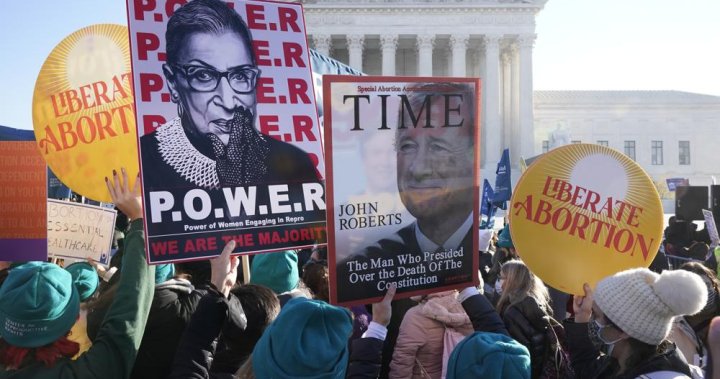
Roe v. Wade: U.S. Supreme Court revisits abortion rights challenge
Global News
The court's decision could dramatically shift the contours of the 2022 midterm elections, providing a new force for Democrats, who largely support abortion rights.
It’s the moment American conservatives have been waiting for.
Oral arguments at the U.S. Supreme Court on Wednesday represent the best opportunity leaders on the right have had in decades to gut the landmark 1973 Roe v. Wade decision, which codified a woman’s constitutional right to an abortion before a fetus can survive outside the womb.
If they are successful, it could validate years of often painstakingly granular work that ultimately remade the Republican Party from an alliance of business-friendly leaders into a coalition of cultural conservatives and evangelicals who turned the issue of abortion into a national flashpoint. Even if the justices don’t explicitly overturn Roe, they could open the door to a flurry of new restrictions that would please the right.
Buoyed by a court that is now dominated by a 6-3 conservative majority, some leading Republicans were already expressing confidence on Tuesday.
“We are asking the court in no uncertain terms to make history,” former Vice President Mike Pence, who has been laying the groundwork for a presidential run in 2024, said during a speech in Washington. “We are asking the Supreme Court of the United States to overturn Roe v. Wade and restore the sanctity of life at the center of American law.”
The justices will weigh whether to uphold a Mississippi law that bans abortion after 15 weeks, with limited exceptions — well before the current established point of “viability,” at around 24 weeks. The court is also weighing challenges to a Texas law that bans abortions after six weeks — before many women even know they’re pregnant.
The court could decide to uphold current precedent, could let the law stand, effectively doing away with the current viability standard, or could overturn Roe entirely.
“This is the first time that they have clearly had a majority of pro-life-leaning justices,” said Columbia Law School’s Carol Sanger, an expert in reproductive rights. ”So they have the votes if they choose to use them.”













